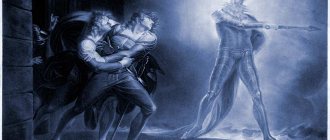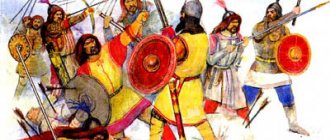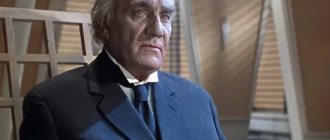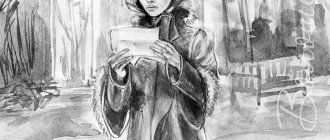- Summary
- Shukshin
- Microscope
“Zagotzerno” is a small workshop where Andrey Erin works as a carpenter. He is an ordinary guy, he likes to have a good drink, but he also works well, and he also considers himself a researcher at heart. He is interested in everything - unusual mechanical details, the structure of matter, the origin of microbes and how they affect the human body, and why a person lives not 150 years, but half as long. Because of his aspirations for knowledge, Andrei has long dreamed of his own microscope, but his wife will not allow it - all the money goes to the family and for family, necessary things.
One day Andrei took 120 rubles from a book, bought a microscope - the natural scientist’s soul could not stand it, and he told his wife that he had lost the money. The wife cursed for a long time and fought with a frying pan. Andrei steadfastly defended himself with a pillow, but did not respond; he received a good blow to the head with the frying pan. Realizing that her husband was in pain, she sat down and began to lament about her unfortunate lot. When it came to working two shifts, Andrei said that he had already agreed that he would work one and a half shifts, and then clarified that when he discovered the loss, he returned to work and made an agreement.
My wife was offended for a week. And then she started to walk away. A couple of days after the storm subsided, Andrei brought home, beaming with happiness, his brand new microscope and said that he was given it at work instead of a bonus. His wife muttered that it would be better if they gave him a vacuum cleaner, but Andrei had no time for caustic remarks. Together with his son Petka, he examined under a microscope everything that came to hand. They counted microbes in the soup, in the water, and in their own blood. He even stopped drinking and explored everything day and night. His wife even thought that he would go crazy, but she liked his “learned” interest.
On one of these wonderful days of research, when Andrei and his son were trying to find a way to kill microbes, Andrei’s colleague came to visit them from work, specifically to look through a microscope. Andrei doesn’t want to show him, but at this time his wife says that it would be better if they gave him another, useful bonus at work, and not a microscope. The colleague is confused about what kind of bonus we are talking about - there was no bonus. Andrei's gut sank, and his life darkened in an instant.
The wife guessed that the lost money, which should have gone to the children for new fur coats, was spent on a microscope. Andrei did not spend the night at home that night, he came back the next day with a hangover - his wife was not at home, nor was his microscope. The son said that she took the microscope to sell. Andrei sadly nodded his head to his son and told him to go into science, and then went to bed, and his life returned to its previous course.
In this story, two worlds collide - the world of dreams, hope, attraction to the new and unknown; the world of everyday life and pragmatism. As often happens in life, the second world displaces the first, not leaving it even a small opportunity for development. Andrei's son may actually become a scientist in the future and make his father's dreams come true, and perhaps he will adopt his mother's values and become as pragmatic as she is. Which one is right is up to the reader to decide. But the author is on the side of his hero.
You can use this text for a reader's diary
About the product
The story “Microscope” by Shukshin was written in 1969. According to the author’s own classification, this work is a “fate story”, since the entire life path of a person is shown over a short period of time.
The story raises the theme of purpose and meaning in life. Having found a life goal, the main character changed for the better, but only for a short time.
To better prepare for a literature lesson, we recommend reading a summary of “Microscope” online. A retelling of the book will also be useful for the reader's diary.
The material was prepared jointly with the highest category teacher Lyubov Alexandrovna Koroshchup.
Experience as a teacher of Russian language and literature - 30 years.
Other retellings and reviews for the reader's diary
The diary, of course, conveys Zhenya’s childish spontaneity. She herself cannot impress others with anything, and she does not try. She gets straight C grades, because for the Sister of a great musician, grades are nonsense. Why try? After all, she has a brilliant brother
The work of the famous French writer and philosopher Albert Camus, “The Myth of Sisyphus,” written in 1942, perhaps became one of the most high-profile works of that time, touching on the problem of the philosophy of absurdism, which is still relevant today.
The work tells the story of a small people, called the Picts, who prepare a sweet drink from the heather that blooms in their region.
A wizard and his wife settled in a mountain estate. He was going to settle down, but his soul asked for magic and the owner of the estate cannot deny himself “pranks.”
In 1959, a new author appeared in the horror genre, who immediately fell in love with all fans of this genre. This man's name is Stephen King.
Source
Summary
A carpenter from a small workshop, Andrei Erin, finally made up his mind. Arriving home, he admitted to his wife Zoya that he had lost one hundred and twenty rubles. At the same time, he hid his eyes, and “his broken nose (crooked, with a hump) turned from yellow to red.”
Zoya roared, grabbed the frying pan and began to fight with her husband. He fought back with a pillow, but the angry wife still “contrived and hit him painfully on the head.” Yerin “threw the pillow, grabbed his head, and groaned.” Seeing that he was not pretending, Zoya threw the frying pan to the side and howled again. It was difficult for the woman to come to terms with the loss - she saved this money for a long time to buy warm winter clothes for her children.
His wife decided that Andrei should now work two shifts and walk to work in order to earn back the lost money. It was then that he let slip that he had already “agreed with the foreman” to work one and a half shifts. Seeing his wife's puzzled look, he got out of it - they say, he immediately returned to the workshop when he noticed the money was missing.
For a whole week Andrei Erin “felt bad” - Zoya could not calm down and scolded him from morning to evening. Finally, the passions subsided, and Andrey realized – it’s time!
Late one evening, Erin brought home a heavy box. He beamed quietly and kept “waiting for people to pay attention to him.” It turned out that the box contained a microscope, which he was “given for his shock work.” Together with his fifth-grader son, Andrei began to enthusiastically look at microbes. Zoya also became interested in the device, but no matter how she looked, she did not see any microbes.
From that day on, Andrei Erin’s life changed. An inquisitive scientist awakened in him, who dreamed of penetrating the secrets of the universe. “My son and I sat for hours at the microscope, examining” samples of water from a well, a drinking bucket, rain, and puddles. Erin increasingly wondered: “How can we overcome the hated microbes?”
A serious blow for him was the news that there are microbes in the blood - small, round, “chasing each other.” He did not understand why scientists had not yet shared this important information with the people. Andrey decided to fight microbes with his own methods: thin wire, electric current.
One day, his colleague Sergei Kulikov came to see Erin. Being drunk, he began to praise the home-grown scientist, for whom, if necessary, a “golden monument” would be cast and glorified throughout the world.
Zoya was flattered to hear such speeches about her husband, but she still grumbled that it would be better if they gave her a vacuum cleaner at work rather than a microscope. Kulikov was puzzled - no one gave anything to anyone. So Zoya realized that the microscope was bought with “lost” money.
Fearing his wife's revenge, Andrei spent the night at Kulikov's that evening and got terribly drunk. Returning home the next day, he learned that Zoya had taken the microscope to the second-hand store. Erin told his son to never drink, but to study science.
Bacteria attack!
Erin Sr. looked into the microscope all evening long and saw bacteria there in large numbers. He examined everything possible: ordinary and rain water, street dirt and even blood. His “scientific” research led to the conclusion: bacteria are everywhere! And scientists are hiding a terrible secret from people: bacteria do not allow a person to live for the 160 years he is entitled to.
At this point, the hero begins to think about how to clear the atmosphere of parasites. This is a rather interesting story, led by V. M. Shukshin. “Microscope,” the summary of which, we hope, conveys a certain mood, makes the reader’s heart skip a beat. The latter asks himself: “What will happen next?”
Microscope
One day Andrei brings home a microscope, or rather a box with it, and says that he was given a bonus at the factory for his hard work. The wife complained: “It’s a pity that it’s not a vacuum cleaner.” From now on and forever, a device for scientific research becomes the center of attraction for the whole family. Even the spouse is curious: what are they (father and son) looking for in this thing?
What does V. M. Shukshin present to the reader? “Microscope” is a fantastic-realistic work that truthfully describes the characters of people.
Exposure
Suddenly, Andrei’s colleague Seryoga appears in the house. He is completely drunk and shouts loudly to the whole hut that he also wants to look at germs. Andrei's fame as a scientist spread throughout the village. My wife is pleased that her Erin is becoming a popular person. But here she talks about her regret that bonuses at the plant are given out exclusively by microscopes, and not by vacuum cleaners. Sergei, whom Andrei did not have time to warn, made his eyes wide and asked: “What awards?” The wife understood everything, but decided to briefly retell Andrei’s story to her husband’s colleague.
Of course there was a scandal. The friends went out to drink. They squandered 20 rubles - Andrey came home only at lunchtime the next day. My wife went to take the microscope to a second-hand store. Naturally, the device will no longer be at home, but the children will have new coats for winter.
What did V. M. Shukshin want to show us? “Microscope,” the summary of which only makes you smile, unexpectedly ends on a moral note. The hero tells his son to study. By being literate, he will be able to live a more meaningful life than his father.
“Microscope”, analysis of Shukshin’s story
Genre features
The story “Microscope” is the fate of a person outlined in one episode, taking only two weeks. According to Shukshin’s classification, this is a “story-fate”.
Issues
The story raises the philosophical problem of the purpose and meaning of life. The main idea of the story is that life without a goal is empty, it is not life at all. Other problems are mutual understanding between people and family relationships, the moral problem of human dignity and self-respect.
Heroes of the story
The main character of the story is Andrey
Shukshin singles out only two portrait features of the hero: a yellow face and a nose red with excitement. The nose is a characteristic feature of the hero. It is broken, crooked, with a hump.
For this, the wife calls the hero a crooked nose. One might think that this is an affectionate nickname, but, despite the diminutive suffix, crooked nose is a curse word. The wife’s other curse words are also offensive and well-aimed. She calls
The wife despises her husband, considers him a nonentity and is sure that he does not know how to joke.
The hero is soft and indecisive. He humbly endures his wife’s scolding, does not answer her when she fights, but defends himself with a pillow and tries to persuade her. He agrees to all of his wife’s conditions because he feels guilty: he is ready to walk to work, work two shifts for a month, and not drink “little drink” after the bath.
Andrei Erin is transformed after he brings home a secretly purchased microscope, saying that he received it for his shock work. Andrei was so happy that he “stood and quietly glowed.” And his wife compares him to a bare bottom that glows in the moonlight. At the moment the dream comes true, Andrei receives a first and last name from the author.
His character changes. He fusses not guiltily, as usual, but condescendingly. It turns out that he knows how to joke and laugh. Having become the owner of a microscope, he feels surprisingly brave.
Now Andrei is rude to his wife: “She’s glaring. You are fat yourself. Whole ham.”
He criticizes her for finding any penny in her pocket, but not seeing any germs. Erin became “the loud boss of the house.” He improved his relationship with his wife, who respected him, and had a common cause with his fifth-grader son.
Andrei stopped drinking himself and even disdained drunks.
During the week that Andrei had a microscope in the house, he became the main person in the house. He talked about microbes, about science, and made plans for humanity’s fight against microbes. Andrei was shocked when he saw through a microscope that there were microbes in the blood. He tried to kill them with a thin needle, and figured out how to destroy them with electric shock.
All his ideas were far from science, but Andrei became famous in the village, so his fellow villagers talked about his microscope and scholarship.
When Sergei Kulikov, who worked with Andrei, let slip to Andrei’s wife Zoya that they had not been given any bonus, Andrei, deprived of his dream, turned into the same drinking, timid man who depended on his wife for everything. He became unhappy again.
Andrei's wife Zoya sees the meaning of life in the well-being of the family. She holds both her husband and children under a tight rein. The wife not only calls her husband names, but also hits him with a frying pan in order to “take away his darling.”
Zoya received a name in the story (as if in passing, in parentheses) only when she became interested in the microscope.
Zoya is the voice of many Russian women who are forced to carry weirdos like Erin on their shoulders. This is what her cry is about, her lament, telling about Zoya’s hard fate, about how she denied herself and her children, saved money to... buy them fur coats. At the end of the story, having taken the microscope to the commission shop, she actually goes to buy fur coats.
Immersed in everyday worries, Zoya missed her happiness: her husband, passionate about his “business,” again lost his purpose in life and turned into a nonentity. Zoya chose material things – fur coats for the children and a vacuum cleaner.
Plot and composition
The story “Microscope” has no compositional beginning and end. In the first paragraph we are talking about the fact that “he” (there is no name or even nickname of the hero) decided on something. From the next paragraph it becomes clear that the hero lost 120 rubles of money and decided to tell his wife about it. But soon the reader realizes that Andrei Erin decided on an adventure: he deceived his wife, lost money, and he himself bought his lifelong dream - a microscope.
Understanding comes to the reader after the phrase: “Andrey was waiting. Finally he decided that it was possible.”
Andrey's life is divided into life without a microscope and with a microscope.
The microscope is the meaning of the hero’s existence; it becomes the title of the story. Erin's life is transformed thanks to a microscope. But the reader understands that the microscope in the hero’s hands is just a toy. Erin sees no more through a microscope than his fifth-grader son.
The whole story is a metaphor that has lost its imagery: Andrei literally hammers nails with a microscope, just plays with it. For him, the microscope is a source of intense emotions and deep thoughts. Are the most important moments in life worth 120 rubles?
At the end of the story, Andrei is forced to become “normal” again, realizing that he cannot spend money intended for family needs, because, of course, he needs to buy fur coats.
Is the story told by V. M. Shukshin true?
Someone, having read “Microscope” (Shukshin’s story), will say that this is fiction, and there are no such factory workers. We are afraid to disappoint the reader, but such people exist. Imagine that a person, by the will of fate, became who he is. It doesn’t matter who he is - a factory worker or a train driver, but his spiritual nature is alive and requires some kind of food for its existence. In a similar way, such an eccentric with a microscope or a machinist who is fond of books on the history of Russia arises.
Existentialist philosophers say that a person can do anything, including overcoming the force of circumstances. Unfortunately, this is usually very difficult. Especially when a person has a desire to live his own life in adulthood. For some people, self-awareness matures quite late. A person wants to live, his spiritual aspiration rebels and demands an outlet, but he already has a wife, children - the complete set. Therefore, he seeks salvation in wine, but does not find it.
V. M. Shukshin (“Microscope,” the contents of which were discussed by us a little earlier) forces us to analyze the moral side of the story. It’s not for nothing that the writer decided to talk about an ordinary person. He tried to show, on the one hand, the comical position of such a hero, and on the other, the tragic. There is nothing funny about a broken destiny and broken dreams. Shukshin does not choose such a hero on a whim; he tries to draw the reader’s attention to an ordinary, ordinary, unremarkable person in order to remind us of the aphorism of I. V. Goethe: “Every person is a whole world that is born with him and with him dies. Beneath every gravestone lies a world history.”
The full version of the story, written by Shukshin (“Microscope”), is recommended for reading by both adults and schoolchildren. Moreover, it is small. You can finish it in about ten minutes.
Source
Analysis 2
Shukshin’s work “Microscope” was first published in the 11th issue of “Rural Youth” in 1969.
The genre is a realistic story, which takes place in a simple working-class family. This, as the author defines it, “story-fate” in one episode from the life of the main character reveals his entire difficult fate.
The story raises problems of relationships between people and in the family, duty and honor, human dignity. But the main idea of the work is the idea of the meaning of human life, that without a specific goal a person cannot live normally. This is the idea of the story.
Andrey Erin, the main character of the work, works as a carpenter. He has a soft character and is indecisive in his actions. The author seems to divide his life into the period before acquiring a microscope and the period when he brought the microscope into the house.
Andrei was accustomed to the eternal scolding of his wife, who considered him a loser and called him names in every possible way; he could not resist and defend himself from these eternal reproaches. But Andrey had one dream - to acquire a microscope. He had this dream in his plans for a long time, and finally decided to deceive his wife and bought a microscope, explaining her purchase by saying that they had given her a bonus at work.
The microscope brought changes not only to Andrei’s daily life, but also to his character. He completely transformed, became more confident in himself, boldly rebuffed his wife, which earned her respect, he even stopped drinking. Together with the microscope, he acquired happiness and became the main person in the house, who was respected.
Reading the story, we understand that Andrey does not need this microscope at all, that this money, which was always missing in the family, would be better spent on clothes for the children. But together with Andrei we rejoice at his short-lived happiness, and when the wife learns from her husband’s employee that he was not given any bonus, we sadly see how Andrei changes and becomes unhappy. The microscope is handed over to a second-hand shop, but he started drinking again, lost interest in life and became timid, completely dependent on his wife. He has lost his purpose in life.
In the image of the main character's wife Zoya, the author depicted the life of ordinary Russian women who bear on their shoulders all the hardships of everyday life, in which there is always a lack of money for a normal existence. One can understand her, because she saved this money, spent on a microscope, to clothe her children. At the end of the story, Zoya still buys fur coats for the children. She chooses the material, not the spiritual, which is what her husband lived with. Zoya was never able to understand her husband, and if she had understood, then life in the house would have been better.
Loss of 120 rubles
It all starts with the fact that the main character, Andrei Erin, makes a decision. True, what exactly is not entirely clear, since the first lines of the story tell about a family quarrel. The hero comes home and tells his wife that he lost 120 rubles (decent money in those days). She grabs the frying pan, he grabs the pillow. The scene of the showdown of marital relations is, on the one hand, funny, on the other – tragic.
The most interesting thing is that V. M. Shukshin (“Microscope”) reproduces in his story a certain archetype of a family quarrel in Russia. Even now, when we think about a picturesque marriage showdown, a frying pan comes to mind as a tool in the hands of the wife.
We continue further. And so they ran after each other until his wife hit Andrei on the head. Then it was decided that our hero would work for a month and a half without days off and thereby patch up the family budget. Of course, he works at a factory, but where else?





